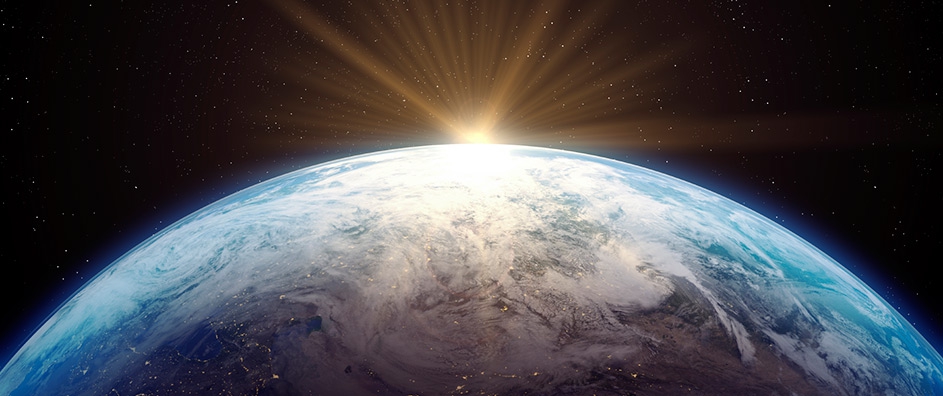The views expressed in our content reflect individual perspectives and do not represent the authoritative views of the Baha'i Faith.
…we are at the beginning of the golden age that prophets and poets have depicted in song and fable. The people who have come in contact with this spirit of the age hold that the time has come when the highest concepts of man are to be realized and become part and parcel of every nation’s fabric. – Abdu’l-Baha, Divine Philosophy, p. 12.
In the final essay in this series on the state of the world, let’s look briefly at one very important global goal that the UN’s Millennium Development Goals didn’t cover: ending worldwide conflict and war.
Arguably, no human disaster comes even close to war in producing devastation, destruction and death. Wars decimate entire populations, ruin civilizations that took centuries to build, damage the environment and leave total ruin in their wake. Wars create famines, refugee crises, disease epidemics, mental illnesses, crime, and untold human suffering. No one wins a war, the Baha’i teachings say in a very emphatic way—in fact, war actually “destroys the basis of the structure of humanity:”
…war is conducive to the destruction of the foundation of the edifice of humanity, the cause of devastation of the world of commerce, industry, arts and trade. The combatants—the conqueror and the conquered—are both losers. Neither party gains any substantial profit. The two combatants are like unto two ships which collide against each other. One may sink to the bottom of the sea, but the other will also carry away its injuries and bruises. Therefore, the victor and the defeated fail to obtain any benefit. The utmost is this: Temporarily one country holds the territory of another. This is of a short duration. In the course of the life of that nation, a time will sooner or later come when the conquered will become again the conqueror.
So many wars have taken place! So many countries are devastated, so many cities are ruined; and yet people are not satisfied with human butchery, are not satisfied with carnage and bloodshed. Still the hearts are stiff and unfeeling! Still the souls are callous and cold, still the minds are dark and frigid, still the people are unsusceptible and unyielding, still they are in deep sleep! Oh! When will they be awakened? When will they become merciful? When will they practice the Golden Rule? This hatred and animosity destroys the basis of the structure of humanity, while love and amity are conducive to the well-being and prosperity of mankind.
Why this tyranny? Who has obliged them to perpetuate these acts of savagery! The kings and the rulers, the politicians and the statesmen live in the utmost ease in their palaces and send these innocent men and peasants who have never seen each other, into the battlefield to tear each other to pieces with shells and cannon balls. The armies are the pawns to be played with on the chess-board of their fiendish ambitions! How cruel is this! How pitiless is this! How brutal is this! How ferocious is this! These so-called leaders of humanity are not willing to let even one hair fall from their heads. They are cowards and are sulking in darkness. Why do they send these thousands and thousands of men to the field of carnage, to be mowed down by each other like the grass! – Abdu’l-Baha, Star of the West, Volume 4, pp. 164-165.
Given the terrible toll wars and warmongers exact, how is the world doing in preventing them? Here’s what the UN’s MDG final 2015 report has to say on that subject:
Conflicts remain the biggest threat to human development. By the end of 2014, conflicts had forced almost 60 million people to abandon their homes—the highest level recorded since the Second World War. If these people were a nation, they would make up the twenty-fourth largest country in the world. Every day, 42,000 people on average are forcibly displaced and compelled to seek protection due to conflicts, almost four times the 2010 number of 11,000. Children accounted for half of the global refugee population under the responsibility of the United Nations High Commissioner for Refugees in 2014. In countries affected by conflict, the proportion of out-of-school children increased from 30 per cent in 1999 to 36 per cent in 2012. Fragile and conflict-affected countries typically have the highest poverty rates.
Just one current conflict—the civil war in Syria—now threatens to overwhelm the entirety of Europe with the enormous and growing refugee crisis it has produced. Ending wars and conflicts—a major, named objective in the new UN Sustainable Development Goals for 2016-2030—might seem like a pipe dream to some, but the world has proven, over the course of the past seven decades, that it is possible.
Since 1945 and the end of World War II—by far the most deadly war in human history, with 50 million killed—the world’s nations have mostly managed to avoid large-scale nation-against-nation warfare, or so-called “interstate conflicts.” We have initiated and fought many smaller proxy wars, civil wars and regional “intrastate” conflicts, all of them devastating, but none, thankfully, at the wholesale global level of the past. Today, according to the renowned scientists Steven Pinker and Andrew Mack in The Guardian:
The world is not falling apart. The kinds of violence to which most people are vulnerable—homicide, rape, battering, child abuse—have been in steady decline in most of the world. Autocracy is giving way to democracy. Wars between states—by far the most destructive of all conflicts—are all but obsolete. The increase in the number and deadliness of civil wars since 2010 is circumscribed, puny in comparison with the decline that preceded it, and unlikely to escalate.
We can conclude, then, given all the evidence we’ve gleaned in these ten essays from the Millennium Development Goals report and from several other sources, that the overall state and condition of the world has definitely improved, and continues to move in that positive direction. All of these evidence-based statistics and factual data points increasingly lead objective observers to an inescapable fact: greater and greater percentages of humanity now live to a ripe old age. Most of humanity now co-exists in peace. In fact, the world has never witnessed such a relatively peaceful era.
Despite what we see over-emphasized in the media, we have war, conflict, poverty, hunger, inequality, early death and disease on the run. We have, through global cooperation and a heightened consciousness of human oneness and a fragile but growing international unity and a renewed sense of determination, just begun to realize that glorious Golden Age vision of a world made new. We have enormous reason for hope.
The state of the world, then, in so many quantifiable ways, has never been better. We have much room for improvement, certainly, as long as people still live in war zones, sick, hungry and in poverty. But we now have the tools and the growing global determination and the spiritual fortitude—and the profound, compelling insights of the Baha’i teachings—to allow us to turn those terrible things into relics of a fractious past. From a Baha’i perspective, then, we can form a more perfect future world, every day, by:
..striving toward a single goal: to turn this nether dust into high heaven, to make of this world a mirror for the Kingdom, to change this world into a different world, and cause all humankind to adopt the ways of righteousness and a new manner of life. – Abdu’l-Baha, Selections from the Writings of Abdu’l-Baha, p. 70.
You May Also Like
Comments

















Papua New Guinea.
Thanks copied to share with friends.